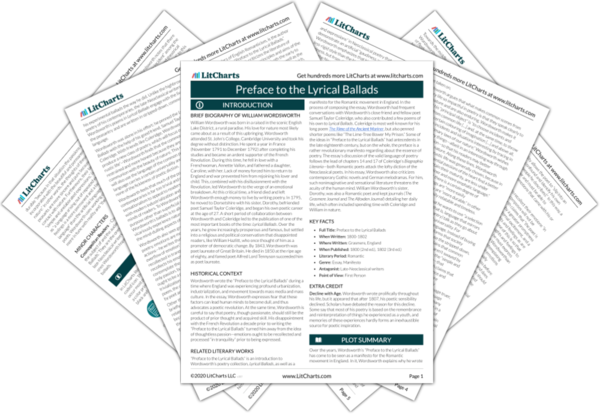Late-Neoclassical Writers Quotes in Preface to the Lyrical Ballads
[…] it is proper that I should mention one other circumstance which distinguishes these Poems from the popular Poetry of the day; it is this, that the feeling therein developed gives importance to the action and situation and not the action and situation to the feeling.
For a multitude of causes unknown to former times are now acting with a combined force to blunt the discriminating powers of the mind, and unfitting it for all voluntary exertion to reduce it to a state of almost savage torpor.
Except in a very few instances the Reader will find no personifications of abstract ideas in these volumes, not that I mean to censure such personifications: they may be well fitted for certain sorts of composition, but in these Poems I propose to myself to imitate, and, as far as possible, to adopt the very language of men, and I do not find that such personifications make any regular or natural part of that language. I wish to keep my Reader in the company of flesh and blood, persuaded that by so doing I shall interest him.
Poetry sheds no tears "such as Angels weep," but natural and human tears; she can boast of no celestial Ichor that distinguishes her vital juices from those of prose; the same human blood circulates through the veins of them both.
I have one request to make of my Reader, which is, that in judging these Poems he would decide by his own feelings genuinely, and not by reflection upon what will probably be the judgment of others.

Late-Neoclassical Writers Quotes in Preface to the Lyrical Ballads
[…] it is proper that I should mention one other circumstance which distinguishes these Poems from the popular Poetry of the day; it is this, that the feeling therein developed gives importance to the action and situation and not the action and situation to the feeling.
For a multitude of causes unknown to former times are now acting with a combined force to blunt the discriminating powers of the mind, and unfitting it for all voluntary exertion to reduce it to a state of almost savage torpor.
Except in a very few instances the Reader will find no personifications of abstract ideas in these volumes, not that I mean to censure such personifications: they may be well fitted for certain sorts of composition, but in these Poems I propose to myself to imitate, and, as far as possible, to adopt the very language of men, and I do not find that such personifications make any regular or natural part of that language. I wish to keep my Reader in the company of flesh and blood, persuaded that by so doing I shall interest him.
Poetry sheds no tears "such as Angels weep," but natural and human tears; she can boast of no celestial Ichor that distinguishes her vital juices from those of prose; the same human blood circulates through the veins of them both.
I have one request to make of my Reader, which is, that in judging these Poems he would decide by his own feelings genuinely, and not by reflection upon what will probably be the judgment of others.











